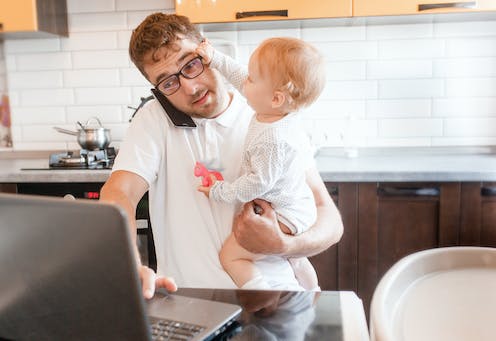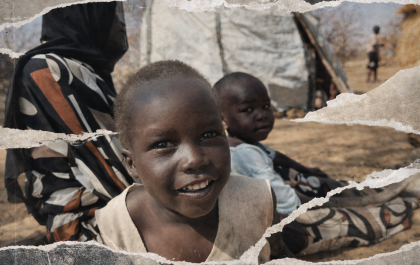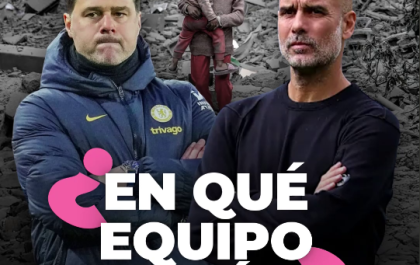Este medio se sostiene gracias a su comunidad. APOYA EL PERIODISMO INDEPENDIENTE .
Maria Svetlychnaja / Shutterstock
When a working woman becomes a mother, she automatically becomes part of the “working mothers” collective. The same, however, is not true for men: the term “working father” is not a term that is commonly used, although everyone understands its meaning.
Since language is never neutral, it is easy to understand why this difference exists: according to social norms, motherhood is a primary source of identity for women, yet fatherhood is not for men. That’s why it is not surprising that even the policies and measures established for creating a work, personal life and family balance have been mainly aimed at women and only residually at men.
The situation, nevertheless, is slowly changing in Europe, since men also want to take part in childcare and since the demographic context compels them to take on a serious role in the duty and the right to provide care.
Parents who adapt their work to create a balance
Research on reconciling work and family life coined the term known as the “one-and-a-half earner model” to refer to the core family model where both parents work but one of them (usually the woman in heterosexual couples) reduces her working time in order to take on childcare obligations.
Although this model is especially widespread in central European countries such as Austria and Germany, the underlying cause of this model (where it is the woman who subordinates herself, adapts or even renounces her work life in order to raise her children) is common in many other countries.
Thus, in Europe as a whole, about 6.4% of fathers (compared to 34% of mothers) with dependent children up to the age of 15 have adapted their work in some major way as a result of their paternity, such as reducing their working hours, working part-time or switching to less demanding tasks. This percentage ranges, however, from less than 5% in most of the eastern countries up to more than 20% in the Netherlands or Switzerland (with relatively high percentages in the Nordic countries as well).
Although the profile of these working parents varies according to the countries, in addition to the type of adaptation they make, in Europe as a whole it is more likely that adaptations have been made in the case of white-collar workers (except managers), when the contract is temporary, in the case of the self-employed, when the partner works more than 40 hours and has a high level of education, and when they work in “family-responsible” companies (understood as those that at least offer time flexibility to their staff).
Actions that companies can take
During the 2019-2022 period, the Men in Care European project, co-funded by the European Commission, implemented actions in companies and organisations in eight European countries to promote male joint responsibility and thereby progress towards a society in which men also put care at the centre of their lives.
The public policies that most encourage parents to start providing care with the arrival of their first baby were studied. It was determined that countries with non-transferable and well-paid birth or parental leave have more parents who use them compared to countries that have transferable, poorly paid or low-capped policies.
In Spain, Iceland, Norway and Slovenia, parents used the benefits much more than in Germany, Austria or Poland. Since 2021, Spain has become the only country in the world to offer non-transferable, equal leave for mothers and fathers.
After a baby’s first year of life, which can be essentially covered by the different leaves of absence from employment, companies can promote joint responsibility in care through other policies used by men, such as reducing overtime, compressing the working day, adapting working hours and work shifts to childcare needs, a 30-to-35-hour working week without salary reduction, and regulated and voluntary remote work.
An infographic and a company guide have been drawn up to explain how to support male caregivers in seven steps and the benefits for companies. Workshops have also been held with working parents and management staff, which interested entities can request through the Spanish National Distance Education University (UNED). Lastly, the project’s partner organisations make seven policy recommendations at the European level to incorporate men into caregiving.
Irina Fernández Lozano has received research funding from the European Commission and the Ministry of Science and Innovation.
Este periodismo no lo financian bancos ni partidos
Lo sostienen personas como tú. En un contexto de ruido, propaganda y desinformación, hacer periodismo crítico, independiente y sin miedo tiene un coste.
Si este artículo te ha servido, te ha informado o te ha hecho pensar, puedes ayudarnos a seguir publicando.
Cada aportación cuenta. Sin intermediarios. Sin líneas rojas impuestas. Solo periodismo sostenido por su comunidad.
Related posts
SÍGUENOS
Vídeo | Más de 9.000 detenidos sin juicio y la horca en el horizonte: Israel cruza otra línea roja
Mientras la Knéset acelera la pena de muerte para palestinos, Gaza arde con bombas de 3.500 °C suministradas por Estados Unidos
Sudán al borde del abismo: más de 1.000 días de guerra y el hambre como arma
La ONU advierte que lo peor está por llegar mientras el país con mayor nivel de hambre del mundo se desangra entre asedios, drones y abandono internacional.
Espiar al Congreso para proteger a Trump: el escándalo que asoma tras los papeles de Bondi sobre Epstein
La pregunta es devastadora: por qué el Departamento de Justicia monitoriza qué documentos consulta una representante electa en el ejercicio de su función de control.
Vídeo | Pascal Kaiser y el precio de existir en público
Cuando la visibilidad se castiga y el odio actúa con impunidad, la pregunta ya no es por qué cuesta mostrarse, sino quién protege a quienes lo hacen. El 30 de enero, en un estadio con 50.000 personas, un árbitro amateur alemán hizo algo tan cotidiano…
Vídeo | ¿En qué equipo estás?
Mismo deporte. Dos formas de estar en el mundo.


 Seguir
Seguir
 Seguir
Seguir
 Seguir
Seguir
 Subscribe
Subscribe
 Seguir
Seguir




